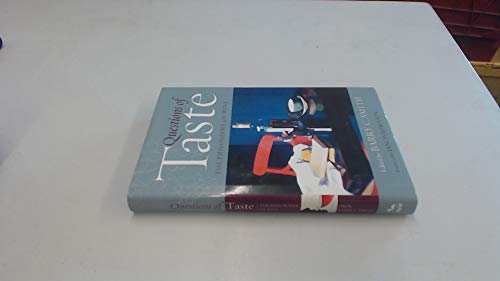Verwandte Artikel zu Questions of Taste: The Philosophy of Wine

Zu dieser ISBN ist aktuell kein Angebot verfügbar.
Alle Exemplare der Ausgabe mit dieser ISBN anzeigen:Die Inhaltsangabe kann sich auf eine andere Ausgabe dieses Titels beziehen.
„Über diesen Titel“ kann sich auf eine andere Ausgabe dieses Titels beziehen.
- VerlagSignal Books Ltd
- Erscheinungsdatum2007
- ISBN 10 1904955290
- ISBN 13 9781904955290
- EinbandTapa dura
- Anzahl der Seiten224
- Bewertung
Neu kaufen
Mehr zu diesem Angebot erfahren
Versand:
EUR 15,12
Von Vereinigtes Königreich nach USA
Beste Suchergebnisse bei AbeBooks
QUESTIONS OF TASTE: The Philosophy of Wine
Buchbeschreibung Hardcover. Zustand: New. Zustand des Schutzumschlags: As New. 1st Edition. This copy is in new, unmarked condition bound in burgundy cloth covered boards with bright gilt titling to the spine. This copy is bright, tight, white and square. The unclipped dust wrapper is lightly sunned but still in as new condition. International postal rates are calculated on a book weighing 1 Kilo, in cases where the book weighs more than 1 Kilo increased postal rates will be quoted, where the book weighs less then postage will be reduced accordingly. Interest in and consumption of wine have grown exponentially in recent years and there has been a corresponding increase in consumers' knowledge of wine, which in turn has generated discussions about the meaning and value of wine in our lives and how renowned wine critics influence our subjective assessment of quality and shape public tastes. Wine first played a part in Western philosophy at the symposium of the early Greek philosophers where it enlivened and encouraged discussion. During the Enlightenment David Hume recommended drinking wine with friends as a cure for philosophical melancholy, while Immanuel Kant thought wine softened the harsher sides of men's characters and made their company more convivial. In "Questions of Taste", the first book in any language on the subject, philosophers such as Roger Scruton and wine professionals like Andrew Jefford, author of the award-winning book "The New France", turn their attention to wine as an object of perception, assessment and appreciation. They and their fellow contributors examine the relationship between a wine's qualities and our knowledge of them; the links between the scientifically describable properties of wine and the conscious experience of the wine taster; what we base our judgements of quality on and whether they are subjective or objective; and, the distinction between the cognitive and sensory aspects of taste. They also examine: whether wine appreciation is an aesthetic experience; the role language plays in describing and evaluating wines; the significance of their intoxicating effect on us; the meaning and value of drinking wine with others; whether disagreement leads to relativism about judgements of taste; and whether we can really share the pleasures of drinking. "Questions of Taste" will be of interest to all those fascinated by the production and consumption of wine and how it affects our minds in ways we might not hitherto have suspected. Ref TTT 3. Bestandsnummer des Verkäufers 030607
Weitere Informationen zu diesem Verkäufer | Verkäufer kontaktieren

